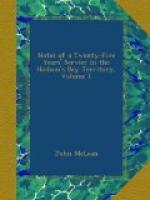Here (in lat. 61 deg. north)[2] we raise crops of barley and potatoes—the former in abundance every year,—the latter, however, are sometimes cut off by the frosts; but this is no more than happens in Canada, and many parts of the United States. The fact is, that there are many favourable situations for agriculture to be found in every district of the Company’s territories, except perhaps one or two on the shores of Hudson’s Bay. The banks of the Athabasca, Peace, Slave, and McKenzie rivers present many localities fit for farming operations; and in the more southern districts they are, of course, far more frequent.
[Footnote 2: On the banks of the McKenzie River.]
Had the Protestant ministers been allowed a free scope, and the encouragement they at first received been continued, they would ere now have had Missions established in many districts; and there can hardly be a doubt that they would have succeeded here, as elsewhere, in overcoming the natural sloth of the natives. Their good intentions, however, have been frustrated, and they have now the additional mortification of finding themselves supplanted by Romish priests, who, no later than last year, were allowed a free passage in the Company’s craft, even to a district where a Protestant Missionary had been settled for several years previously, and had made considerable progress in converting the natives. Not only was he allowed a passage to the district, but he was lodged and entertained in the Company’s establishment.
The consequences of this strange procedure are obvious: the poor ignorant natives, hearing such conflicting doctrines, are at a loss what to think or what to believe; and, naturally enough, conclude that both are alike impostors, and therefore in many cases decline their instructions. It must be acknowledged, however, that the Romish priest is often more successful than the Protestant missionary, and that for obvious reasons. With the former, the Indian needs only profess a desire to become a Christian, and he is forthwith baptized; whereas with the latter, a probationary course—a trial of the proselyte’s sincerity—is deemed indispensable. The peculiar dress, moreover, of the Romish ministers, and their imposing ritual, make a great impression on the senses of a barbarous people.
“He indeed,” say the Indians, when speaking of the priest, “he indeed looks like a great ‘man of medicine;’ but these others are just like our traders; we can see no difference.”
The fact, too, need not be disguised, that we ourselves find the priests far more accommodating than these meddling parsons. The priests, for instance, allow us to amuse ourselves in any manner we think fit, week-day or Sunday; and far from finding fault, ten to one if they don’t join in the sport; the Protestant minister, on the contrary, never allows a violation of the sacred day to pass unnoticed, nor fails to warn the delinquent of the consequences.




